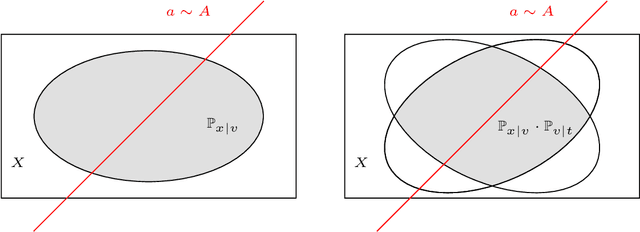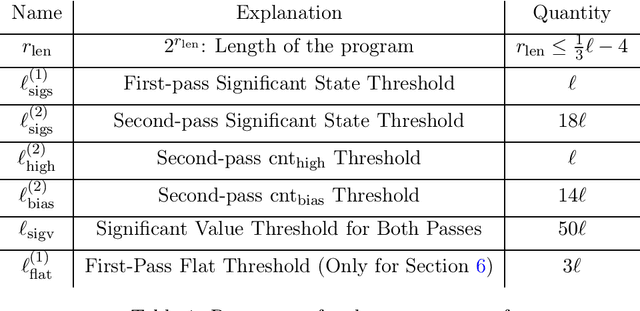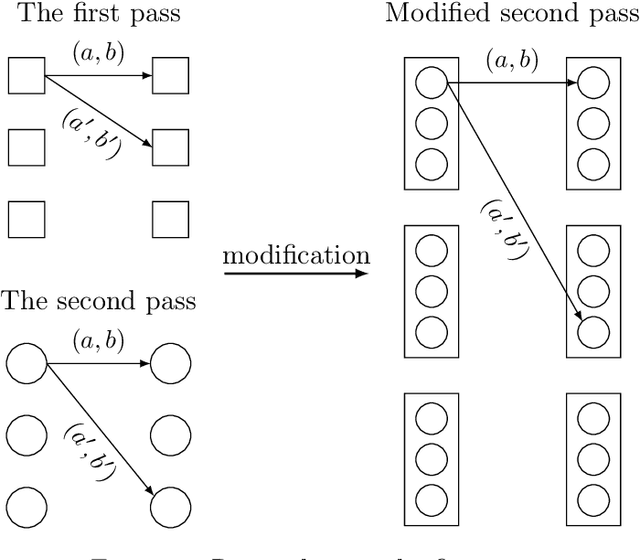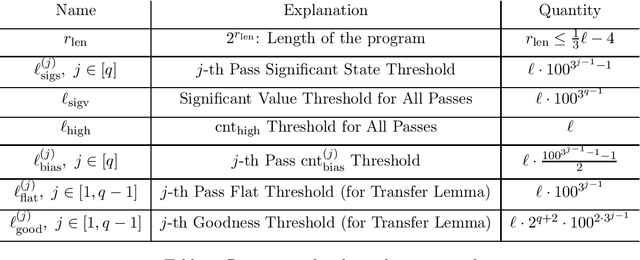Avishay Tal
Tight Time-Space Lower Bounds for Constant-Pass Learning
Oct 12, 2023



Abstract:In his breakthrough paper, Raz showed that any parity learning algorithm requires either quadratic memory or an exponential number of samples [FOCS'16, JACM'19]. A line of work that followed extended this result to a large class of learning problems. Until recently, all these results considered learning in the streaming model, where each sample is drawn independently, and the learner is allowed a single pass over the stream of samples. Garg, Raz, and Tal [CCC'19] considered a stronger model, allowing multiple passes over the stream. In the $2$-pass model, they showed that learning parities of size $n$ requires either a memory of size $n^{1.5}$ or at least $2^{\sqrt{n}}$ samples. (Their result also generalizes to other learning problems.) In this work, for any constant $q$, we prove tight memory-sample lower bounds for any parity learning algorithm that makes $q$ passes over the stream of samples. We show that such a learner requires either $\Omega(n^{2})$ memory size or at least $2^{\Omega(n)}$ samples. Beyond establishing a tight lower bound, this is the first non-trivial lower bound for $q$-pass learning for any $q\ge 3$. Similar to prior work, our results extend to any learning problem with many nearly-orthogonal concepts. We complement the lower bound with an upper bound, showing that parity learning with $q$ passes can be done efficiently with $O(n^2/\log q)$ memory.
Extractor-Based Time-Space Lower Bounds for Learning
Aug 08, 2017Abstract:A matrix $M: A \times X \rightarrow \{-1,1\}$ corresponds to the following learning problem: An unknown element $x \in X$ is chosen uniformly at random. A learner tries to learn $x$ from a stream of samples, $(a_1, b_1), (a_2, b_2) \ldots$, where for every $i$, $a_i \in A$ is chosen uniformly at random and $b_i = M(a_i,x)$. Assume that $k,\ell, r$ are such that any submatrix of $M$ of at least $2^{-k} \cdot |A|$ rows and at least $2^{-\ell} \cdot |X|$ columns, has a bias of at most $2^{-r}$. We show that any learning algorithm for the learning problem corresponding to $M$ requires either a memory of size at least $\Omega\left(k \cdot \ell \right)$, or at least $2^{\Omega(r)}$ samples. The result holds even if the learner has an exponentially small success probability (of $2^{-\Omega(r)}$). In particular, this shows that for a large class of learning problems, any learning algorithm requires either a memory of size at least $\Omega\left((\log |X|) \cdot (\log |A|)\right)$ or an exponential number of samples, achieving a tight $\Omega\left((\log |X|) \cdot (\log |A|)\right)$ lower bound on the size of the memory, rather than a bound of $\Omega\left(\min\left\{(\log |X|)^2,(\log |A|)^2\right\}\right)$ obtained in previous works [R17,MM17b]. Moreover, our result implies all previous memory-samples lower bounds, as well as a number of new applications. Our proof builds on [R17] that gave a general technique for proving memory-samples lower bounds.
 Add to Chrome
Add to Chrome Add to Firefox
Add to Firefox Add to Edge
Add to Edge